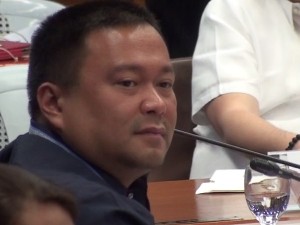
Sen. JV Ejercito INQUIRER.net FILE PHOTO
MANILA, Philippines – If everything else fails, President Aquino should talk to power plant owners to keep their prices low in the spot market, Sen. Joseph Victor Ejercito said Monday.
Ejercito, who called for an inquiry into the P4.15 per kilowatt hour power rate adjustment, said that the President wields influence over the power generators especially because most, if not all, are his supporters.
“If the President would flex his arms, he can convince them to keep their prices low and help ease the burden of the people,’’ he said.
The Energy Regulatory Commission, Department of Energy and spot market operator, the Philippine Electricity Market Corp. had issued a resolution setting a new lower price ceiling for power sold at the spot market.
The new price cap is down to P32 per kWh from P62 per kWH, but this will remain in effect only until a new price ceiling is set “not later than 90 days’’ from Dec. 27, the date the resolution was issued.
The resolution, coming on the heels of a public furor over the record P4.15 power adjustment that Manila Electric Co. is collecting from its 5.3-million customers to recover some P9.6-billion additional power costs, did not pacify some lawmakers.
This was a “knee-jerk reaction’’ to the consumers’ anger over high power rates, said Bayan Muna Rep. Neri Colmenares, one of those who petitioned the Supreme Court to stop the collection of the P4.15.
The long-term solution, Colmenares said, would be the abolition of the Wholesale Electricity Spot Market in favor of a regulated power generation and distribution.
Meralco said it had been forced to buy power at a higher rate from the WESM in view of the month-long maintenance shutdown of the Malampaya gas pipeline beginning Nov. 11, and the unscheduled shutdown of at least eight power plants.
The Senate energy committee inquired into alleged collusion among power generators, who were also players on the spot market, to bring the price up by creating an artificial shortage of electricity.
The rate increase was to be implemented in December, February and March, but the Supreme Court on Dec. 23 issued a temporary restraining order stopping Meralco from the going ahead with the power rate adjustment.
“I hope this would become permanent,’’ Ejercito said, referring to colleague Sen. Sergio Osmeña’s prediction that the price cap would permanently plateau at P32 per kWh. “It now appears it could be done.’’
As seen in the last several years, the restructuring of the power industry under the Electric Power Reform Industry Act of 2001 led to even higher power rates, hence, the need to review the law, Ejercito said.
“It was supposed to promote competition, but this did not happen,’’ he noted.
When the energy sector was restructured under the Epira law, the WESM was created to allow power suppliers to trade excess energy and agree on prices.
The fact that the Epira law was enacted six months after his father, then President Joseph Estrada, was toppled amid charges of incompetence, inefficiency and corruption in January 2001 wasn’t lost on Ejercito.
“This could have been part of the conspiracy. My father objected to high power and water rates,’’ he said.
Ejercito said it was only proper for the Senate energy committee to resume the hearing on the power rates so the possible collusion of power generators could be exposed.
“I have suspicions about the simultaneous shutdowns by the plants because there’s a program for shutdowns. The hearing should expose the collusion,” he said.
Related stories
Meralco set to refund customers after high court TRO on rate hike
Meralco to refund pre-TRO payments
Meralco to enforce TRO on rate hike but hints at adverse effects